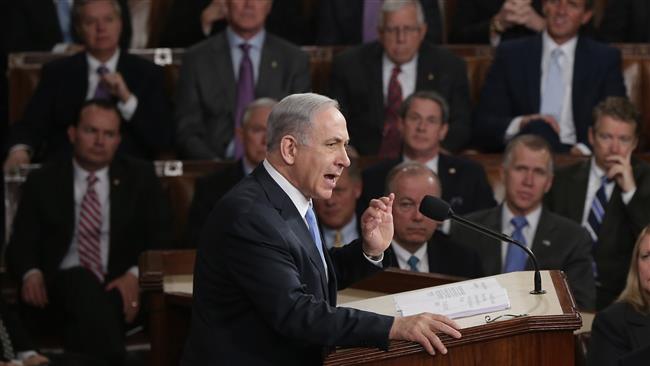 Israeli Prime Minister Benjamin Netanyahu speaks about Iran during a joint meeting of the US Congress in the House chamber at the US Capitol on March 3, 2015 in Washington, DC.[/caption]
Israeli Prime Minister Benjamin Netanyahu speaks about Iran during a joint meeting of the US Congress in the House chamber at the US Capitol on March 3, 2015 in Washington, DC.[/caption]When Israeli Prime Minister Benjamin Netanyahu†addressed†Congress, he insisted that Iran is much more desperate than the US to get a nuclear deal. Therefore, if more pressure is applied on Iran to get what Netanyahu calls a ďbetter dealĒóno uranium enrichment at alló Iranians will inevitably cave. The prime minister dismissed the possibility that Iran might instead walk away from the table with the crude Orientalist clichť of Iranís bargaining in the Persian bazaar.
Yet a European delegation that visited Tehran on March 2-3 got a very different impression. The delegationómade up of members of the European Parliament, former high-ranking diplomats, and experts in the energy fieldówas organized by the Friedrich Ebert Stiftung, an influential foundation associated with the Social Democratic Party, currently part of Germanyís ruling coalition. The delegation met with Iranian officials in the foreign ministry and members of the parliament. It also held brainstorming sessions with the foreign ministryís Institute for Political and International Studies (IPIS) on the future of EU-Iran relations.
Participants in the discussions emphasized the fundamental divergence of perspectives. Europeans choose to put the nuclear issue at the center of their relations with Iran. But from Tehranís perspective, the nuclear file is no more than a stumbling block impeding cooperation in a number of areas where the EU and Iran have common interests, such as Iranís potential role in diversifying the EUís energy supplies and the fight against the terrorist Islamic State (ISIS or IS). That said, all Iranian interlocutors supported the efforts of the negotiating team led by Foreign Minister Javad Zarif in resolving the nuclear issue.
Significantly, the ďprinciplists,Ē the conservatives who dominate the Iranian parliament, also conveyed this message. Despite the hype about Iranian hardliners potentially scuppering any deal negotiated by Zarif, they have exercised greater restraint so far than their peers in the US Congress. The powers of the Iranian parliament are not to be underestimated. MPs can sack individual ministers, as they did when they†brought down†the reformist Minister of Education Reza Faraji-Dana and†threatened†to impeach another reformist, Minister of Culture Ali Jannati.
Although Zarif has had to face some pretty tough questioning in parliament, the MPs have so far toed the line set by Supreme Leader Ayatollah Khamenei in support of the negotiations. There is a consensus around what is deemed an acceptable deal. It should not infringe on Iranís rights under the Nuclear Non-Proliferation Treaty (NPT), including enrichment. It should contain provisions for the lifting of ďunlawful and illegalĒ sanctions. And any restrictions on Iranís nuclear program going beyond the NPT should be temporary.
As to the suspected military dimensions of Iranīs nuclear program, both MPs and foreign ministry officials, including†Zarif†himself, keep insisting that the acquisition of nuclear weapons would not improve Iranīs strategic position. In the words of an influential conservative Iranian lawmaker, ďthe fact that Pakistan possesses nuclear weapons does not prevent the US from sending drones to that country.Ē On the nuclear issue, Iranians generally present a united front, framed in the language of Iranís national dignity.
Contrary to Netanyahuís suggestions, the chances are much higher that, if faced with renewed pressure and sanctions, Iran would not succumb. Rather, it would opt out of the negotiations, unilaterally unfreeze the key elements of its nuclear program frozen under the Joint Plan of Action (JPA) of November 2013, and begin to build new centrifuges. Iranians stress that sanctions canít take away their technical expertise. Nor does Iran feel as isolated as the West sometimes portrays it. The Non-Aligned Movement, a 120 nation-strong bloc,†has backed†Iranís nuclear stance. Government officials also point out that China has replaced Germany as Iranís main trading partner. If the nuclear negotiations collapse due to new American sanctions, Iranians expect that the existing sanctions architecture would crumble, with not only Russia and China, but also EU countries pursuing their economic and energy interests in Iran independently of US sanctions.
That said, the outcome preferred by the mainstream of Iranís political opinion and the public at large is still clearly to have a deal with the West. Although the wounds in the relations with the US will take time to heal, no such impediments exist in the case of Europe. Iranians from different walks of life still feel a strong cultural affinity with Europe. They also point to a number of shared concerns where cooperation, in Tehranís view, would be beneficial for both sides.
For instance, at all meetings, the Iranians raised the issues of European fighters joining IS in Syria and Iraq and the spread of the Wahhabi ideology among Muslims in Europe, suggesting the importance of joint efforts to counter these trends. Also mentioned was the diversification of Europeís oil and gas supplies as well as Iranian interest in European expertise and investment in renewable energy, environment protection, and water managementóall areas that, importantly, are not covered by the sanctions regime. Profound disagreements persist in the area of human rights, but most Iranian interlocutors agreed that a way should and could be found to discuss these issues.
Following Netanyahuís advice would not produce a ďbetter deal.Ē Renewed sanctions will not cause Iran to make more concessions. It would only kill the opportunity of a historic rapprochement between the West and Iran, potentially paving the way for another disastrous war in the Middle East. And that would be a very bad deal indeed.
By Lobe Log










